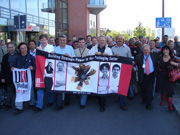New Networks in Mayr-Menholf and TetraPak to Build Strategic Power

“In times of crisis we need more union rights, more information, more solidarity; we need to be more organized in order to achieve the signing of new global agreements”, said Michel Muller, President of UNI Graphical during the opening of the Packaging and Paper Converting Sector Conference.
The Global Conference on the packaging and paper converting sector held in Berlin on April 20-21 brought together more than 80 participants from all the regions (40% of them delegates or shop stewards!). Union representatives from Nampak, Smurfit, MeadWestvaco and the above mentioned Mayr-Menholf, TetraPak, as well as Kimberly Clark, among others, enthusiastically debated the most appropriate strategies to defend their members in times of crisis and strengthen the right to organize and collective bargaining.
“Over the next few months we will have to confront the consequences of a perverse system that has left millions of families in despair. Unions are facing a great opportunity to build a new alternative in view of the scenario of failure left by neoliberalism,” stated Frank Werneke, Vice President of Ver.di. “Unions have to be part of the construction of a new legal order that respects worker rights,” he underscored.
The Conference gave a green light to the creation of new networks and the strengthening of existing ones. “As Philip Jennings said, we want to get to the Third UNI Congress in Nagasaki with 50 global agreements and 50 union networks,” said Michel. “Networks enable us to exchange experience, meet and have our voices heard at the global level,” he added.
The participants had the opportunity to debate research on the packaging and paper converting sector presented by Professor Rob Lambert of the University of Western Australia. It will be published by UNI Graphical and the link on the Internet is available for those who request it.
In the course of the Conference, the history and implementation of the agreement with Nampak was examined. “I feel proud of having negotiated this global agreement with the company and being part of a network that effectively serves the interests of workers,” stated Glenn Jackson, Nampak shop steward and member of UNITE-United Kingdom. Lemmy Mokoena, Nampak shop steward in South Africa and member of CEPWAWU, recalled the process by which the signing of the global agreement was reached. “We are profoundly pleased to know that with this agreement we have supported not only our brothers and sisters in the facilities of the company in Zambia, Tanzania, and Mozambique, but also our colleagues of UNITE, in the United Kingdom,” said Lemmy.
At the Conference there was an opportunity to analyze relations with the European Works Councils and the implementation of the global network in Kimberly Clark. “We are building an instrument to strengthen solidarity among the workers,” said Leeann Anderson of the US union USW, which presides over the network. The Steering Committee of the Global Network in K-C met to analyze the meeting UNI G held with the company in April and organize the Global Conference that will take place in 2010.
The conclusions of the four working groups that met during the Conference are relevant to transform the discussions into effective action paths. “More than ever we have to defend the right to information and consultation in the face of a crisis generated by the lack of rules and responsibility for mistaken decisions made by the high level executives of the companies,” said Steve Walsh, AMWU Australia, who coordinated one of the groups. “Workers have the right to know how high the salaries of company executives that close plants and lay off workers are,” underscored Peter Ellis, from UNITE-United Kingdom. “Through the network we will establish in MMP we will be able to get more power for our members,” said Wolfgang Weinish – head of company’s EWC and member of Ver.di. “We met here with colleagues from Russia, Tunisia, Turkey, Germany, Austria, United Kingdom, and Spain, and we want to defend the interests of workers at the global level,” he reported.
Ronny Larsson TetraPak shop steward in Sweden and member of Grafiska reported on behalf of the Group. “We need a global network, said Ronny, to be more effective in our actions.”
Duncan Brown, CEP - Canada and President of the UNI G Working Group on Multinationals, summarized the proposals and invited the people heading each of the networks to join the UNI Graphical Working Group on Multinationals that will be holding its next meeting in October in Madrid.
“This Conference is the fruit of systematic work in the area of packaging and paper converting,” said Adriana Rosenzvaig. “The decisions we are making have the support of union representatives from all the continents,” she stated.
For more information: adriana.rosenzvaig@uniglobalunion.org

